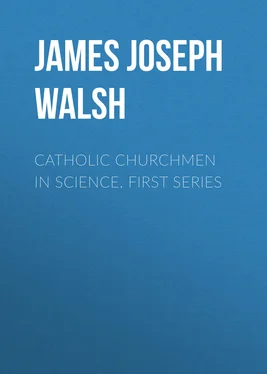James Walsh - Catholic Churchmen in Science. First Series
Здесь есть возможность читать онлайн «James Walsh - Catholic Churchmen in Science. First Series» — ознакомительный отрывок электронной книги совершенно бесплатно, а после прочтения отрывка купить полную версию. В некоторых случаях можно слушать аудио, скачать через торрент в формате fb2 и присутствует краткое содержание. Жанр: foreign_prose, foreign_religion, foreign_antique, на английском языке. Описание произведения, (предисловие) а так же отзывы посетителей доступны на портале библиотеки ЛибКат.
- Название:Catholic Churchmen in Science. First Series
- Автор:
- Жанр:
- Год:неизвестен
- ISBN:нет данных
- Рейтинг книги:4 / 5. Голосов: 1
-
Избранное:Добавить в избранное
- Отзывы:
-
Ваша оценка:
- 80
- 1
- 2
- 3
- 4
- 5
Catholic Churchmen in Science. First Series: краткое содержание, описание и аннотация
Предлагаем к чтению аннотацию, описание, краткое содержание или предисловие (зависит от того, что написал сам автор книги «Catholic Churchmen in Science. First Series»). Если вы не нашли необходимую информацию о книге — напишите в комментариях, мы постараемся отыскать её.
Catholic Churchmen in Science. First Series — читать онлайн ознакомительный отрывок
Ниже представлен текст книги, разбитый по страницам. Система сохранения места последней прочитанной страницы, позволяет с удобством читать онлайн бесплатно книгу «Catholic Churchmen in Science. First Series», без необходимости каждый раз заново искать на чём Вы остановились. Поставьте закладку, и сможете в любой момент перейти на страницу, на которой закончили чтение.
Интервал:
Закладка:
It must not be forgotten, after all, that the reasons advanced by Copernicus for his idea of the movements of the planets were not supported by any absolute demonstration, but only by reasons from analogy. Nearly a hundred years later than his time, even after the first discoveries had been made by the newly constructed telescopes, in Galileo's day, there was no absolute proof of the true system of the heavens. The famous Jesuit astronomer, Father Secchi, says the reasons adduced by Galileo were no real proofs: they were only certain analogies, and by no means excluded the possibility of the contrary propositions with regard to the movements of the heavens being true. "None of the real proofs for the earth's rotation upon its axis were known at the time of Galileo, nor were there direct conclusive arguments for the earth's moving around the sun." Even Galileo himself confessed that he had not any strict demonstration of his views, such as Cardinal Bellarmine requested. He wrote to the Cardinal, "The system seems to be true;" and he gave as a reason that it corresponded to the phenomena.
According to the astronomers of the time, however, the old Ptolemaic system, in the shape in which it was explained by the Danish astronomer Tycho Brahe, who was acknowledged as the greatest of European astronomers, appeared to give quite a satisfactory explanation of the phenomena observed. The English philosopher, Lord Bacon, more than a decade after Galileo's announcement, considered that there were certain phenomena in nature contrary to the Copernican theory, and so he rejected it altogether. This was within a few years of the condemnation by the Congregation at Rome. As pointed out by Father Heinzle, S.J., in his article on Galileo in the "Catholic World" for 1887, "science was so far from determining the question of the truth or falsity of either the Ptolemaic or the Copernican system that shortly before 1633, the year of Galileo's condemnation, a number of savants, such as Fromond in Louvain, Morin in Paris, Berigard in Pisa, Bartolinus in Copenhagen, and Scheiner in Rome, wrote against Copernicanism."
As we have said, Copernicus's book was not condemned unconditionally by the Roman authorities, but only until it should be corrected. This assured protection to the principal part of the work, and the warning issued by the Roman Congregation in the year 1820 particularizes the details that had to be corrected. It is interesting to note that whenever Copernicus is spoken of in this Monitum it is always in flattering terms as a "noble astrologer"–the word astrologer having at that time no unworthy meaning. The whole work is praised and its scientific quality acknowledged.
The passages requiring correction were not many. In the first book, at the beginning of the fifth chapter, Copernicus made the declaration that "the immobility of the earth was not a decided question, but was still open to discussion." In place of these words it was suggested that the following should be inserted: "In order to explain the apparent motions of the celestial bodies, it is a matter of indifference whether we admit that the earth occupies a place in the middle of the heavens or not."
In the eighth chapter of the first book, Copernicus said: "Why, then, this repugnance to concede to our globe its own movement as natural to it as is its spherical form? Why prefer to make the whole heavens revolve around it, with the great danger of disturbance that would result, instead of explaining all these apparent movements of the heavenly bodies by the real rotation of the earth, according to the words of AEneas, 'We are carried from the port, and the land and the cities recede'?" This passage was to be modified as follows: "Why not, then, admit a certain mobility of the earth corresponding to its form, since the whole universe of which we know the bounds is moved, producing appearances which recall to the mind the well-known saying of AEneas in Virgil, 'The land and the cities recede'?"
Toward the end of the same chapter Copernicus, continuing the same train of thought, says: "I do not fear to add that it is incomparably more unreasonable to make the immense vault of the heavens revolve than to admit the revolution of our little terrestrial globe." This passage was to be modified as follows: "In one case as well as in the other–that is, whether we admit the rotation of the earth or that of the heavenly spheres–we encounter the same difficulties."
The ninth chapter of the first book begins with these words: "There being no difficulty in admitting, then, the mobility of the earth, let us proceed to see whether it has one or a number of movements, and whether, therefore, our earth is a simple planet like the other planets." The following words were to be substituted: "Supposing, then, that the earth does move, it is necessary to examine whether this movement is multiple or not."
Toward the middle of the tenth chapter Copernicus declares: "I do not hesitate to defend the proposition that the earth, accompanied by the moon, moves around the sun;" while the wording of this proposition had to be changed so as to substitute the term "admit" for "defend." The title of the eleventh chapter, "Demonstration of the Triple Movement of the Earth," was modified to read as follows: "The Hypothesis of the Triple Movement of the Earth, and the Reasons Therefor." The title of the twentieth chapter of the fourth book originally read: "On the Size of the Three Stars [ Sidera ], the sun, the moon, and the earth." The word "stars" was removed from this title, the earth not being considered as a star. The concluding words of the tenth chapter of the first book, "So great is the magnificent work of the Omnipotent Artificer," had to be cancelled, because they expressed an assurance of the truth of his system not warranted by knowledge. With these few unimportant changes, any one might read and study Copernicus's work with perfect freedom.
Traditions to the contrary notwithstanding, Galileo, because of the friendship and encouragement of the churchmen in Italy, had been placed in conditions eminently suited for study and investigation. Several popes and a number of prominent ecclesiastics were his constant friends and patrons. The perpetual secretary of the Paris Academy of Sciences, M. Bertrand, himself a great mathematician and historian, declares that the long life of Galileo was one of the most enviable that is recorded in the history of science. "The tale of his misfortunes has confirmed the triumph of the truth for which he suffered. Let us tell the whole truth. This great lesson was learned without any profound sorrow to Galileo; and his long life, considered as a whole, was one of the most serene and enviable in the history of science."
Copernicus, like Galileo, had clerical friends to thank for an environment that proved the greatest possible aid to his scientific work. His position as Canon of the Cathedral of Frauenburg provided him with learned leisure, while his clerical friends took just enough interest in his investigations and the preliminary announcements of his discoveries to make his pursuit of astronomical studies to some definite conclusion a worthy aim in life. It was this assistance that enabled him to publish his book eventually and bring his great theory before the world.
Copernicus, far from having any leanings toward the so-called "reform" movement (as has often been asserted), was evidently a staunch supporter of his friend and patron Bishop Maurice Ferber, of Ermland, who kept his see loyal to Rome at a time when the secularization of the Teutonic order and the falling away of many bishops all around him make his position as a faithful son of the Church and that of his diocese noteworthy in the history of that time and place. It may well be said that under less favorable conditions Copernicus's work might never have been finished. As it was, his book met with great opposition from the Reformers, but remained absolutely acceptable even to the most rigorous churchmen until Galileo's unfortunate insistence on the points of it that were opposed to generally accepted theories.
Читать дальшеИнтервал:
Закладка:
Похожие книги на «Catholic Churchmen in Science. First Series»
Представляем Вашему вниманию похожие книги на «Catholic Churchmen in Science. First Series» списком для выбора. Мы отобрали схожую по названию и смыслу литературу в надежде предоставить читателям больше вариантов отыскать новые, интересные, ещё непрочитанные произведения.
Обсуждение, отзывы о книге «Catholic Churchmen in Science. First Series» и просто собственные мнения читателей. Оставьте ваши комментарии, напишите, что Вы думаете о произведении, его смысле или главных героях. Укажите что конкретно понравилось, а что нет, и почему Вы так считаете.












